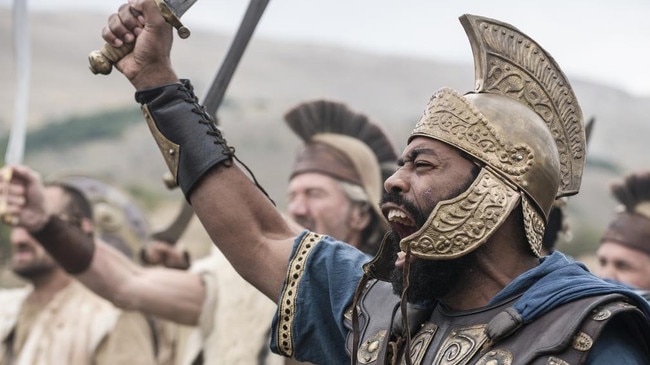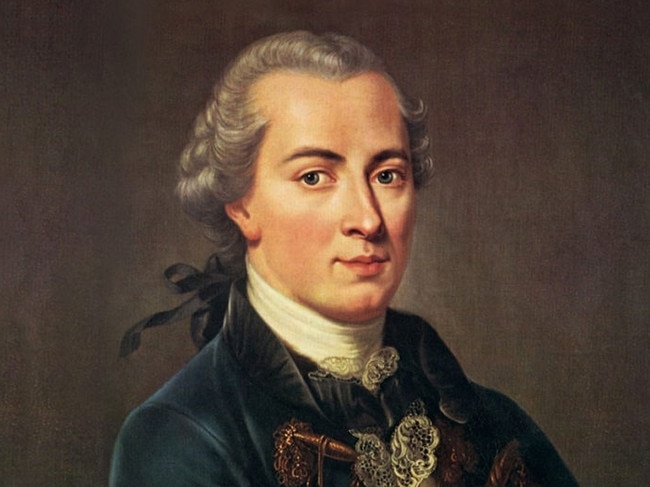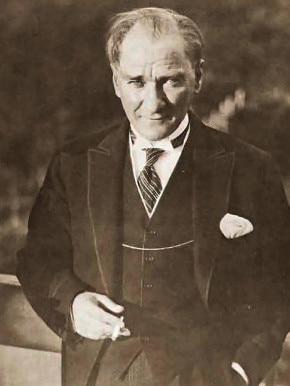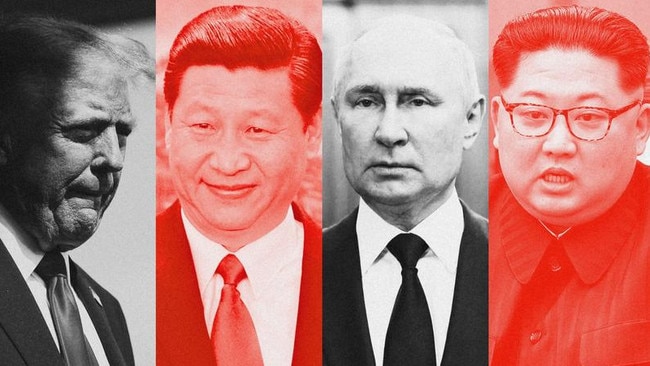World out of order, on the cusp of catastrophe
Immanuel Kant’s vision of a global community that upholds basic human rights is under threat.

Whatever you think of Donald Trump’s return to the White House, come January, the next four years promise to be critical in regard to world order. But what is “world order” and how has it evolved out of an anarchy of states and the rise and fall of empires?
In 1784, a year after the United States won its war of independence, Immanuel Kant wrote his Idea for a Universal History with Cosmopolitan Intent, a brief essay pondering whether world order was in fact evolving in the direction of humanity and rationality. Two hundred and forty years later, we might still ask ourselves that question.

The recent BRICS conference in Kazan, hosted by Vladimir Putin, contemplated an alternative to the American-led world order that has existed since 1945. Xi Jinping’s China plainly aspires to reset world order. Within the US, as the recent presidential election showed, polarisation, populist isolationism and irresponsible fiscal governance imperil the Pax Americana from within.
We need to remind ourselves that “world order” – understood as what we like to call these days a “rules-based order” – is a modern development and Western in origin. Kant was aware of its beginnings when he wrote his essay. He died, in 1804, in the midst of the Napoleonic Wars; an enormous upheaval, part a disruption of what order existed and part the harbinger of radical changes to come.
The Congress of Vienna (1814-15), following the defeat of Napoleon, was a conservative attempt to reset and stabilise the European world. There were no such congresses elsewhere, just variations on conquest and submission. The very idea of such congresses and the idea of “rules-based” orders took centuries to evolve. Let’s briefly retrace that process.
In the West, the Roman Empire is still often seen as emblematic of “world order”, and its fall as a catastrophe. But as Walter Scheidel argues in Escape From Rome: The Failure of Empire and the Road to Prosperity (Princeton, 2019), what slowly emerged out of its ruins was a more dynamic order. It is a dynamic, not a static or imperial, order that is being tested right now.
After Rome fell, the Eastern Roman Empire, with its capital in Constantinople, endured for another thousand years, retreating slowly. That retreat was accelerated by Muslim Arab conquest and colonisation of the Middle East, the whole North African littoral and Spain, between 632 and 732, climaxing with the invasion of France and defeat by the Franks under Charles Martel.
The Arab invasions of the Roman and Persian worlds climaxed in attempts by the Umayyad Arab caliphs, based in Damascus, to finish off the Eastern Roman Empire, which still ruled Greece, the Balkans, the Aegean and parts of Italy, by besieging Constantinople twice: 674-78 and 717-18. They failed both times. There were no congresses to settle things. Constantinople would not fall to Muslim forces (the Ottoman Turks) until 1453.
In 750, black-clad Muslim insurgents, the Abbasids, coming out of Central Asia via Persia and Iraq, overthrew and massacred the Umayyads. They established Baghdad as a new city and the capital of the Arab Caliphate. For a while, Baghdad became the new centre of civilisation. Straddling trade routes linking the Mediterranean with India and China, it became richer, more cultivated and a greater centre of learning than any city in the Europe of the Dark Ages.
If you look at a map of the Mediterranean world at about 800CE, the Caliphate extends from Mesopotamia, via where all the Arab states of our time now sit, across North Africa to the Strait of Gibraltar.
The Emirate of Cordoba, in Spain, was separate. It had been created, in 756, by a scion of the Umayyads, who survived the Abbasid revolution, took over Spain and fought off repeated attempts by the Caliph to destroy his realm. It became the fabled Andalusia.
The Franks, under Charlemagne, had reconstructed a considerable part of the old Western Roman Empire, from Central Italy to the Baltic Sea and from the English Channel to Dalmatia. The Celts, Anglo-Saxons and Vikings were vying for mastery in the British Isles. Russia didn’t exist, though Kievan Rus (Ukraine) would arise, under Oleg the Wise, in the final decade of the 9th century. No congresses settled this as a world order.
The Abbasid Caliphate disintegrated before the storied Crusades, which we grew up hearing about and are now encouraged to deplore. It fell apart due to internal religious schism, dynastic strife and poor governance. Above all, it was subjected, between the 10th and 14th centuries, to invasions by Turkish barbarians and the Mongol armies of Genghis Khan and his progeny, out of Central Asia.
The Seljuk Turks, having conquered the Middle Eastern territories of the Abbasids in the 11th century, invaded what was left of the Eastern Roman Empire. They defeated the Byzantine emperor Romanus IV Diogenes at Manzikert in 1071 and began colonising what would eventually become modern Turkey.
The Seljuk Empire, in turn, came apart, due less to the Crusades (between 1069 and 1291) than to devastating invasions by the Mongols, between 1219 (when Genghis Khan was at his height) and the death of Tamerlane, in 1405.
The Crusades are depicted as symbolic of “imperialism” when they were a response to Muslim imperialism and, in any case, trivial compared to the Turkish and Mongol invasions. One can read of the massacre of thousands by Frankish crusaders in the Holy Land, but the Mongols slaughtered millions and laid waste to whole swathes of fertile country. Hulagu, a grandson of Genghis Khan and a brother of Kublai Khan, sacked Baghdad itself, in 1258.
The Mongols conquered Russia and Ukraine (Kievan Rus), occupying them for centuries. They marauded as far as Poland. But the Ottoman Turks came to pose the greater danger to Europe. Taking what remained of the Eastern Roman Empire from 1300 onwards, they finally captured Constantinople in 1453. They kept advancing into the Balkans for the next 200 years, until defeated outside Vienna, in 1683. All this was done without reference to international law or world order.
The Ottomans took over North Africa from the Arabs and Berbers. Their corsairs ran slave raids in the western Mediterranean and the coasts of Western Europe for centuries, until suppressed by American and European fleets in the 19th century. Their famous defeat at Lepanto, in 1571, by Catholic naval forces didn’t lead to them retreating. They rebuilt their Mediterranean fleet within six months.
But from the late 17th century, the Ottoman Empire began to retreat. It was at that time, also, that (Ming) China was conquered by the foreign Manchurians, who added Mongolia, Qinghai, Xinjiang, Tibet and Taiwan to their empire. But that’s another story.
The Ottomans declined due to technological and military stagnation, as Western Europe underwent a remarkable transformation and, also, outflanked the Ottoman Empire by rounding the Cape of Good Hope and circumnavigating the globe, to access the spices and riches of the Far East (and the Americas). No congresses there either.
The Russians, centred on the Duchy of Muscovy from the 16th century, over the years of Western expansion, from the 16th to the 19th century, annexed Ukraine, Poland, the Baltic States and Finland, and colonised immense territories in Central Asia, Siberia and the Caucasus.
It was in that era, however, that the very idea of “world order” and the “law of nations” began to develop – in the European heartland. The Dutch jurist and polymath Hugo Grotius (1583–1645) laid the foundations for international law in his treatises The Freedom of the Seas (1609) and On the Law of War and Peace (1625), as well as initiating the development of the very idea of universal human rights – an idea rejected by Xi Jinping and those who think like him.
Grotius expounded the core idea of an order of states, moderated not by force but by rational laws and a common understanding that force should be used only to uphold those laws. Think Camelot. Hedley Bull, author of The Anarchical Society, saw Grotius as the inspiration behind the 1648 Peace of Westphalia, which ended the Thirty Years War. He dubbed Grotius “the intellectual father of this first general peace settlement of modern times”.
It was on the foundation of the work of Grotius and others that Kant could write what he did. It is that tradition in which we are anchored when we talk, in the 21st century, of an international rules-based order. After Grotius, Realpolitik, under which, in the words Thucydides attributed to Athenian commanders at Melos, “the strong do what they can, while the weak suffer what they must”, slowly and uncertainly began to give way to principles of international law and human rights.
In reality, of course, the convening and the outcome of congresses had much to do with the preponderance of power. The First World War saw the collapse of the Ottoman Empire, along with the defeat of Germany, the collapse of the Austro-Hungarian Empire and the expansion of the British and French empires. But all this was orchestrated through international congresses: at Versailles (1919) and Lausanne (1923).

As Sean McMeekin showed, in The Ottoman Endgame (2015), it was at Lausanne, in July 1923, that the carving-up of the Ottoman Empire and the creation of new Arab states in the Middle East was arranged. Contrary to legend, however, the key figure in planning that carve-up (in 1916) was neither Mark Sykes nor Georges Picot, but the Tsarist Russian foreign minister Sergei Sazonov. And the dominant figure at Lausanne (in 1923) was none of those individuals, but Mustafa Kemal, the new, modernist, secular master of Turkey.
Lausanne was necessary, because war over the fate of Turkey did not end in 1918. The liberal democrat Eleftherios Venizelos, a Cretan and the founder of modern Greece, longed to reclaim for Greece the empire lost to the Turks between the 11th and 15th centuries. Mustafa Kemal had other ideas and expelled the Greeks from Turkey with great violence. Lausanne settled it – more or less.
The Treaty of Versailles, in 1919, saw the creation of the League of Nations, the first truly Kantian attempt at creating an international order of a new kind. Its failures are legendary. But it set an antecedent which, after the Second World War, led to a fresh attempt: the creation of the United Nations. Both marked conceptual and substantive progress. The UN is, of course, notoriously disunited and in need of an overhaul. But it represents the ideals of Grotius and Kant.
“The history of mankind”, concluded Kant, “remains as a constant objection, because its spectacle compels us to turn away our eyes in disgust.” And yet it is only by remembering history, in the long view, and studying its often disheartening lessons, its endless complexities, that we can hope to formulate better and more effective modes of international order. We are clearly in need of formulating such new, updated ideas in the 2020s.

Right now, we are likely to be distracted by immediate problems – the war in Ukraine, the multi-front war in the Middle East, the tensions in East and Southeast Asia, uncertainties about the US alliance system, governance in the liberal democracies. But it is very important to put all this in a larger frame of reference.
That frame of reference includes the astonishing technological and scientific developments going on, the population implosion taking place globally, as Nicholas Eberstadt points out in the latest issue of Foreign Affairs, and the fact that global challenges require a dynamic and resilient global order of free states more than ever before. Ignore this and you get same old, same old.
The challenges ahead demand that we re-imagine the current order, finding ways to create one able to avert various possible catastrophes.
As things stand, that’s going to take some doing. Kant hoped that “the play of human freedom” would generate rational order. At immense cost, we’ve made progress. The challenge now is to both freedom and order.
Paul Monk is the author of a dozen books, including The West in a Nutshell: Foundations, Fragilities, Futures (2009), Dictators and Dangerous Ideas (2018) and Thunder From the Silent Zone: Rethinking China (2nd edition, 2023).








To join the conversation, please log in. Don't have an account? Register
Join the conversation, you are commenting as Logout